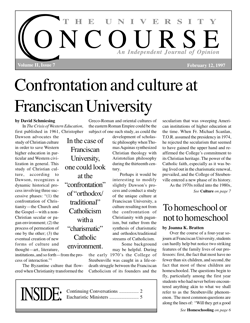A reply on feminism and masculinism
by Michael Healy
In the December 11 issue of the Concourse Elizabeth Magaletta published a reply to my article: “Sexism in Any Form Denigrates both Men and Women.” On a first reading it sounds like a good refutation of my article. However, closer examination reveals that it unfortunately has many flaws. At least four appear in the first paragraph:
1) She assumes that she knows what my motives are. In her words, “Michael Healy’s disagreement with me has, as it seems to me, two roots:” However, the “roots” she suggests for my disagreement with her are not my motives at all, as I show in point (2).
2) She assumes that she knows how I think. She says of me, “he does not perceive that masculinism confers on men more than ego benefits, nor that all men benefit from living in a masculinist culture.” However, I realize these points perfectly well, and I also realize that the majority of cultures have oppressed women. None of this negates the points made in my previous article, as I shall show under point (4).
3) She seems to either misunderstand or misrepresent my article. She says of it, “...it cannot be claimed that women need defense only from ‘certain’ men and that feminism is therefore unnecessary.” Later in her article she seems to say that her impression is that in my article I was trying to prove any defense of women’s rights to be unnecessary. However, my point was not that this was unnecessary, but that the present feminist attempt to do this is insufficient to fulfill the task.
4) She may show ignorance of facts relevant to the topic, or she may have omitted them. In either case, this prevents her from dealing with my true reasons for disagreeing with her. It is not that I do not understand that oppression of women has been quite common in the past and is common today. It is not that I do not realize that the majority of human cultures have been male-dominant. It is that I do realize that there have also been female-dominant societies—such as those that the conquistadores found in some parts of Peru—in which women have been the dominant sex and have relegated men to a secondary role. It is also that I realize that because such societies have existed they could very well exist again, under the proper circumstances. I furthermore realize that there are many men today who fear that feminism’s true goal may be the attainment of such circumstances and the establishment of such a society. If such fears continue to grow they may lead otherwise good men to dismiss feminism’s points as left-wing propaganda rather than to take them seriously and join feminism’s efforts to ensure justice.
Therefore, feminism must neither be continued in its present form nor eliminated. It must be broadened. A rational and just masculinism must be formed as distinct from the male chauvinistic masculinism that Ms. Magaletta so rightly protests. It must then be married to feminism in a union determined to ensure liberty and justice for all. Anything else will ultimately fail.
Regretfully, not only are some of these faults repeated in the body of the article but some other faults appear as well. First, she refers to me as a “neutralist.” However, if I have sufficiently explained my point of view it should be obvious that I do not see myself as holding a position between masculinism and feminism. Rather, I see myself as expounding a view superior to masculinism, feminism, “neutralism,” or any other view reflecting any other combination or facet of these views. This view I would prefer to call, for lack of a better term, “hominism” to indicate that its goal is to ensure the protection of everyone’s rights, even the rights of those who are not presently being oppressed but may be at some time in the future.
She goes on to misrepresent my article once again by suggesting that I might say that if a woman’s husband were not a wife-beater, she would not need to be protected from him. This I would not say. It would be skirting the real issues at stake and would furthermore be an entirely futile argument to make. No, spousal abuse must be punished, like any other crime, and its victims must be protected. However, I doubt that the feminist movement in its present form will be able to provide that protection.
Ms. Magaletta later presents a long list of crimes that she says have been “perpetrated against women considered as women.” This may be true, but the inclusion of certain things in the list must be questioned. Allow me to give two examples. First, in societies such as the Byzantine Empire in which castrated men had better chances of getting the highest-paying jobs—in this case high-ranking court positions—could it not be said that forcible sterilization was performed on men considered as men? It could indeed, for only by cutting his testicles off could a man be made eligible for many high court offices. And second, can it not be said that men are relegated to secondary roles in female-dominated societies? This too can be asserted, for the conquistadores tell of certain areas of Peru in which men stayed home and sewed and did other household chores while women worked in the fields. In other words, this long list looks impressive but not all of its points necessarily hold true under intense analysis.
Let me make myself clear. I do not oppose the protection of the rights and dignity of women. I agree with Elizabeth Magaletta that “the problem…is not one…of hurting people’s feelings” but “of human rights and civil liberties.” I do oppose the idea that the feminist movement in its present form provides the best way to protect women’s rights.
Michael Healy, Jr., Sophomore, Classics


